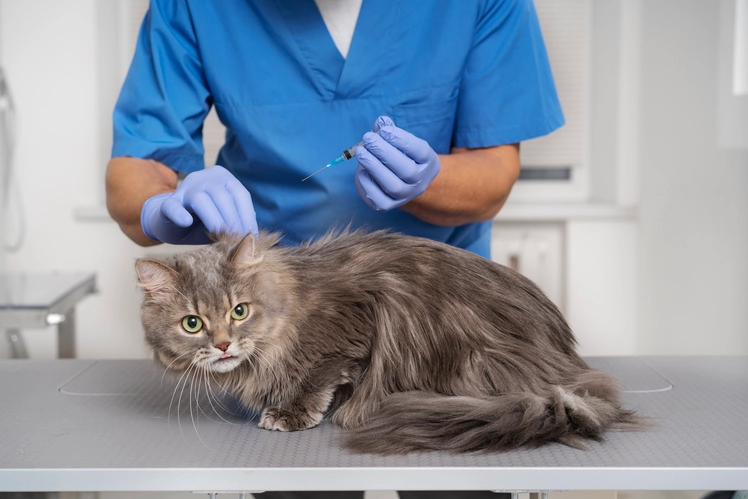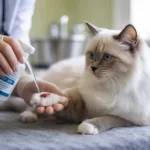
Contents
As responsible pet owners, recognizing the early signs of toxicity in cats is crucial to ensuring their well-being. Whether your cat accidentally ingested something harmful or was exposed to a toxic substance, timely intervention can mean the difference between life and death. Poisoning in cats is more common than most people think and can happen from exposure to common household substances. Cat toxicity symptoms vary depending on the poison and the severity of exposure. In this blog, we’ll discuss the common symptoms of poisoning in cats, what to do if you suspect poisoning, and how to effectively treat and prevent it.
What is Toxicity in Cats?
Toxicity in cats refers to harmful reactions caused by the ingestion, inhalation, or absorption of toxic substances. Common causes include poisonous foods (chocolate, onions, grapes), household chemicals (bleach, antifreeze), and certain plants (lilies, poinsettias). Cats are particularly vulnerable due to their curiosity and grooming habits. Symptoms of toxicity can include vomiting, lethargy, diarrhea, and difficulty breathing. Prompt recognition and emergency veterinary care are critical to prevent serious illness or death.
Types of Cat Poisoning
There are three main categories of pet poisoning in cats:
- Accidental Poisoning: This occurs when a cat unintentionally ingests something harmful, such as a human medication or household cleaner.
- Intentional Poisoning: Sadly, there are instances where a cat is deliberately poisoned. This may involve harmful substances being placed in the cat’s environment.
- Environmental Poisoning: This type of poisoning occurs when a cat is exposed to harmful chemicals, plants, or pollutants, either outdoors or indoors.
Being aware of common household substances that are toxic to cats is vital in preventing poisoning.
Household Substances That Are Poisonous to Cats
Cats often come into contact with everyday items that can be toxic to them. Below is a list of common substances that are dangerous to cats:
- Insecticides: Products used on lawns and gardens to kill pests can be deadly if ingested or absorbed by cats.
- Household Cleaning Agents: Harsh chemicals like bleach, detergents, and disinfectants pose a serious risk to cats if ingested or if they come into contact with the skin.
- Antifreeze (Ethylene glycol): A very common poison, antifreeze has a sweet taste that can attract cats but causes severe kidney failure when ingested.
- Heavy Metals: Exposure to metals like lead or zinc can cause anemia, gastrointestinal distress, and neurological issues.
- Human Medications: Medications such as aspirin, acetaminophen (Tylenol®), and ibuprofen are highly toxic to cats.
- Certain Foods: Foods like onions, garlic, chocolate, grapes, raisins, and xylitol are known to cause severe toxicity in cats.
- Indoor and Outdoor Plants: Plants such as lilies, poinsettias, and tulips are common household and garden items that can be deadly to cats when ingested.
Always keep these items out of reach and be mindful of where your cat roams to prevent exposure. Explore this detailed guide on How to Protect Your Pet From Dangerous Household Foods.
Signs & Symptoms of Cat Poisoning
Poisoning in cats can happen quickly, as they are naturally curious and often explore their surroundings. Recognizing the signs of poisoning early is crucial for reducing the severity of the condition. The symptoms can vary depending on the type of toxin, but here are the common signs and symptoms of cat poisoning to watch for:
Lethargy:
A lethargic or disoriented cat may signal poisoning as the body begins to react to harmful substances. Poisoned cats often show signs of weakness or fatigue, and they may not respond to stimuli as they normally would.
Vomiting or Diarrhea:
Toxins can irritate the gastrointestinal system, leading to vomiting or diarrhea. These symptoms occur as the body attempts to expel the harmful substance. Persistent vomiting or diarrhea may lead to dehydration and further complications, requiring immediate attention.
Excessive Drooling:
Increased salivation or drooling is a common sign of poisoning in cats. Toxins often affect the mouth and throat, leading to excessive drool. Cats may struggle to swallow or have difficulty controlling their salivation when poisoned.
Unusual Breathing Patterns:
Difficulty breathing or irregular breathing patterns, such as rapid or shallow breaths, can indicate severe toxicity. Breathing issues often arise from exposure to chemicals or poisons that affect the respiratory system, requiring urgent veterinary care for diagnosis.
Behavioral Changes:
Poisoned cats may display behavioral changes such as aggression, confusion, anxiety, or restlessness. These changes occur due to the neurological effects of toxins. Cats may act in unusual ways, becoming more fearful, hyperactive, or less responsive to familiar stimuli.
Abnormal Heart Rhythms:
Certain toxins, such as chocolate or xylitol, can disrupt heart function, leading to irregular heartbeats or arrhythmia. Cats may exhibit shallow breathing or an elevated heart rate. Prompt veterinary care is needed to manage these serious symptoms and prevent cardiac arrest.
Tremors and Seizures:
Neurological symptoms like tremors, muscle spasms, or seizures can occur following exposure to certain toxins. These symptoms are particularly concerning, as they may signal damage to the nervous system, requiring immediate treatment to prevent further neurological harm.
Signs of Internal Damage:
Swelling in the abdomen, labored breathing, or signs of kidney failure are signs of internal damage, especially with substances like lilies or antifreeze. These toxic substances cause severe organ damage, and urgent veterinary intervention is needed to save the cat’s life.
If you notice any of these symptoms, seek immediate veterinary assistance to prevent further complications.
What to Do if Your Cat Shows Signs of Poisoning
If you suspect that your cat has ingested something harmful, acting fast can help save their life. Here’s what you should do:
- Stay Calm: Keeping yourself calm will help you make quick, effective decisions.
- Remove Your Cat from the Environment: Ensure they are no longer exposed to the toxic substance.
- Call Your Veterinarian: Provide information on what your cat ingested, including the amount and the time of exposure. If possible, bring the substance or packaging with you to the clinic.
- Do Not Induce Vomiting (unless instructed): In some cases, inducing vomiting may worsen the situation, especially if the toxin is corrosive or harmful when expelled.
- Keep Your Cat Calm: Limit stress by providing a quiet, secure space for your cat as you wait for veterinary care.
Quick intervention is critical in preventing permanent damage.
Diagnosis & Treatment of Poisoning in Cats
At the veterinary clinic, a thorough evaluation is necessary to determine the type of toxin and its effects on your cat. This typically involves:
- Physical Examination: The vet will assess the cat’s vital signs, check for dehydration, and look for signs of poisoning like abnormal gum color or tremors.
- Blood Tests: These tests check for kidney function, liver function, and signs of systemic stress.
- Imaging: If there are signs of internal damage, X-rays or ultrasounds may be used to evaluate organ health.
Follow-up care is crucial to ensure the poison is completely cleared from the cat’s system.
Post-Treatment Recovery and Prognosis
After treatment, your cat will need close monitoring for any signs of relapse or complications. The prognosis largely depends on the severity of the poisoning, how quickly treatment was administered, and the type of toxin involved. Your cat may need to stay in the clinic for hydration, pain relief, and observation for at least 24 hours.
At home, your vet will provide specific care guidelines, including medication schedules and dietary instructions. Regular follow-up visits will help ensure a full recovery and prevent any long-term effects. With prompt treatment, most cats can recover fully, though the prognosis can vary depending on individual circumstances.
Conclusion
Recognizing the symptoms of toxicity in cats is crucial for preventing serious health issues. If you notice signs like vomiting, lethargy, or difficulty breathing, it’s important to act quickly and seek veterinary care. Early intervention can prevent long-term damage and ensure your cat’s recovery.
At North MS Pet Emergency, we offer expert care for pets experiencing poisoning or toxicity. If you suspect your cat has ingested something harmful, don’t wait, reach out to us immediately for prompt treatment and support.
Contact Us Now for emergency care, or visit us for after-hours care.
FAQs
1. Can a cat recover from toxicity?
Yes, many cats can recover from toxicity with prompt treatment, depending on the toxin and severity. Early intervention is crucial, and with the right care, including medications and supportive treatment, cats can often make a full recovery.
2. How do I know if my cat has been exposed to toxins?
Signs of exposure to toxins include unusual behavior, vomiting, diarrhea, lethargy, excessive drooling, or difficulty breathing. If you suspect your cat has ingested or been exposed to a harmful substance, seek veterinary attention immediately.
3. How long does it take for a cat to show signs of toxicity?
Symptoms can appear within minutes to hours, depending on the type of toxin. Some substances cause immediate reactions, while others may take longer. If you suspect toxicity, it’s essential to monitor your cat closely for any unusual behavior.
4. How can I treat my cat’s toxicity at home?
If you suspect toxicity, do not attempt home remedies. Contact your vet immediately. However, you can try to prevent further exposure, keep your cat calm, and follow any instructions provided by the vet until you can seek professional care.
5. What are cat toxicity symptoms treatment?
Treatment for toxicity involves removing the toxin, administering activated charcoal (if recommended), and providing supportive care like IV fluids and pain relief. A veterinarian may use antidotes specific to the toxin, depending on the exposure type and severity.




